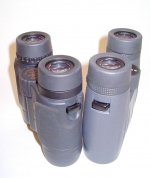This is no way a political a political venture. But do you care where the binoculars are made at a certain price point? Does that psychologically play a role in your decision-making when it comes to binoculars? Or is it all about performance in your criteria book?
If Swarovski, say, started outsourcing their manufacturing to Sri Lanka, will that, for you, affect its status or perception as a brand?
If the Nikon WX was made in Europe, will that be a factor?
The fact that certain companies do not outsource, tell me it does?
I remember reading a review on a Blaser by Allbinos and one of its notes was "made in Germany is questionable". The fact that was pointed out, means it matters somehow?
Another example,the Victory Pocket 8x25 is made in Japan, or at least the sample I got when it was first released—I wonder if some people held back because of that despite it checked all the boxes for them. I wonder if Zeiss was testing public perception when they did that model especially since it's in the Victory line.
Do you guys think it's a valid criterion? Or is it a petty detail?
Thank you!
If Swarovski, say, started outsourcing their manufacturing to Sri Lanka, will that, for you, affect its status or perception as a brand?
If the Nikon WX was made in Europe, will that be a factor?
The fact that certain companies do not outsource, tell me it does?
I remember reading a review on a Blaser by Allbinos and one of its notes was "made in Germany is questionable". The fact that was pointed out, means it matters somehow?
Another example,the Victory Pocket 8x25 is made in Japan, or at least the sample I got when it was first released—I wonder if some people held back because of that despite it checked all the boxes for them. I wonder if Zeiss was testing public perception when they did that model especially since it's in the Victory line.
Do you guys think it's a valid criterion? Or is it a petty detail?
Thank you!






